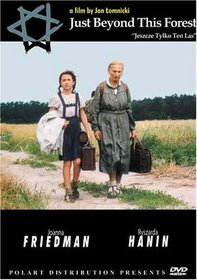| Actors: Ryszarda Hanin, Joanna Friedman, Marta Klubowicz, Marzena Trybala, Marek Bargielowski Director: Jan Lomnicki Creators: Artur Radzko, Krystyna Górnicka, Anna Stronska Genres: Indie & Art House, Drama, Military & War Sub-Genres: Indie & Art House, Drama, Military & War Studio: Polart Format: DVD - Color,Full Screen - Subtitled DVD Release Date: 03/28/2006 Original Release Date: 01/01/1991 Theatrical Release Date: 01/01/1991 Release Year: 2006 Run Time: 1hr 26min Screens: Color,Full Screen Number of Discs: 1 SwapaDVD Credits: 1 Total Copies: 0 Members Wishing: 4 MPAA Rating: Unrated Languages: Polish Subtitles: English |
Search - Just Beyond This Forest on DVD
  | Just Beyond This Forest Actors: Ryszarda Hanin, Joanna Friedman, Marta Klubowicz, Marzena Trybala, Marek Bargielowski Director: Jan Lomnicki Genres: Indie & Art House, Drama, Military & War UR 2006 1hr 26min In 1942, an Aryan washerwoman arrives at Warsaw's ghetto. The Jewish wife she worked for before the war hires her to take her young daughter to the countryside until the war is over. Realizing she has the upper hand, the m... more » |
Larger Image |
Movie DetailsSimilar Movies
Similarly Requested DVDs
|
Movie ReviewsA bittersweet story z hayes | TX | 02/14/2008 (5 out of 5 stars) "Just Beyond This Forest is a Polish language story that is set during the Nazi occupation of Poland. A middle-aged Polish washerwoman goes into the Warsaw Ghetto to 'visit' her former employer, who is Jewish. However this is no social visit, for the washerwoman is beseeched by her former employer to help take her only daughter out of the ghetto and to the countryside, where presumably she will be kept safe till the end of the war. This is in 1942, and the Nazis are stepping up their actions against the Jewish population, and so the washerwoman agrees, not because she feels a sense of gratitude or pity, but for money, some clothes, and a watch. The little girl, who is understandably terrified, goes with the Polish lady, and the rest of the story centers around their experiences whilst trying to get to safety. At heart, it is about the relationship that develops between the Polish lady and her young charge - a tenuous relationship that is at first fraught with suspicion and even malice [on the part of the Polish lady] but later turns into something tender, as she comes to care for the little girl. This is not one of those graphic Holocaust movies that depict the horrors that befell the Jews, but it is quite effective in portraying the sense of fear and desperation, as embodied by the little girl, and how the Nazi occupation changed the social dynamics in Poland, where many Poles who had served in Jewish households as the hired help before the war, were now in a position to decide whether they wanted/wished to help the jews, with varying motives, ranging from true altruism to greed. I would recommend this to those who are interested in movies dealing with the holocaust." An old woman and a young Jewish girl's flight from Warsaw to Richard J. Brzostek | New England, USA | 07/03/2006 (3 out of 5 stars) ""Jeszcze Tylko Ten Las" (Just Beyond this Forest) is the story of an old woman and a young Jewish girl's flight from Warsaw to the countryside in 1942. The old woman worked for the wife of a Jewish doctor, and now, the old woman has an upper hand over them. The Jewish wife pays the old woman to take her daughter out of the ghetto to the countryside. We get to see the ironic twist of events how the servant is now more powerful than the master, and the servant now acts in an ugly way.
I felt sympathetic to the Jewish girl, as she really didn't have an easy time. The girl was being helped for money, not because someone really wanted to help her. There are many instances where she wasn't made to feel welcome, such as when she was brought to the old woman's home the first night, the old woman's daughter was mean and nasty. The old woman herself wasn't always nice also, often being cranky and vulgar. Together, as they journey to the country, the old woman does develop some interest in protecting the girl that is beyond self-interest. "Jeszcze Tylko Ten Las" is a movie where we get to see some irony at work. The old woman agreed to help her former Jewish employers because of the money, and soon after, we see her own daughter wanted some money, but got none. From there, a man tries to con her into paying him or he will turn them into the Gestapo, but another man ends up stopping him with no interest in receiving money. The examples like this run though the entire film. " |








![Live Free or Die Hard [Blu-ray]](https://nationalbookswap.com/dvd/s/14/5914/175914.jpg)






![Home Alone (Family Fun Edition) [Blu-ray]](https://nationalbookswap.com/dvd/s/09/9809/209809.jpg)
